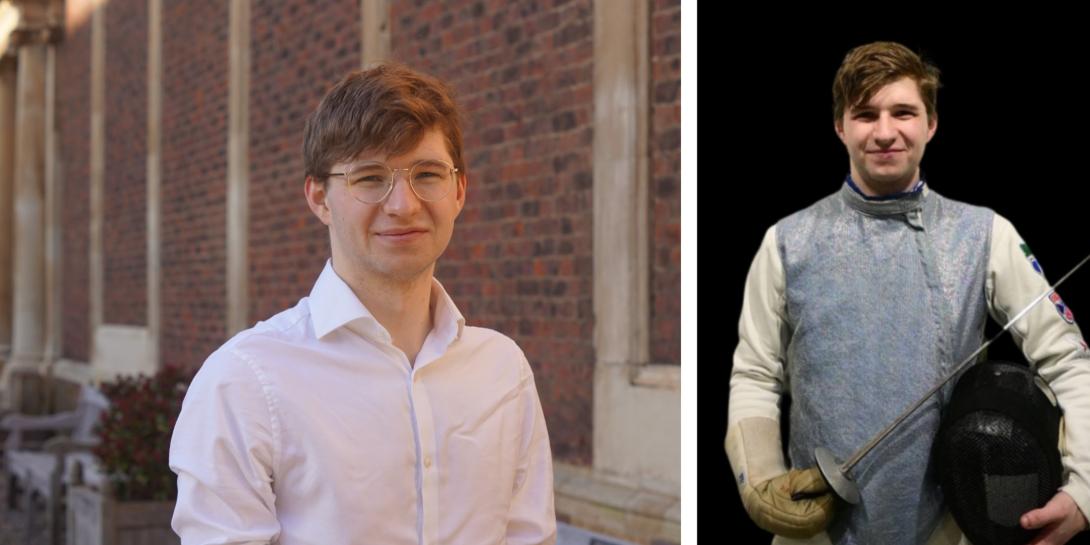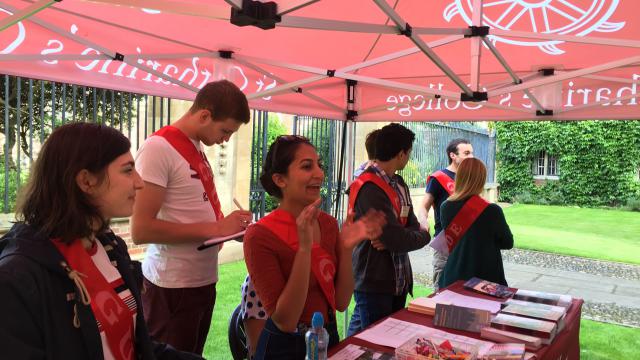Name: Hamish MacLeod
Hometown: Oxford, UK
Extracurricular interests: Fencing (for the University's second team), travelling and hiking
Postgraduate degree: PhD in Chemical Engineering
Life before Catz
“After leaving school, I went to St Andrews to study my MChem in chemistry, where I was able to engage with excellent teaching, and a truly supportive and cohesive department and cohort. During my degree I spent a year studying abroad at the University of Toronto, where I was lucky to work with Prof. Geoffrey Ozin’s solar fuels group, developing a photocatalyst for the breakdown of waste plastic. I was also fortunate to undertake two internships which helped shape my scientific outlook. Firstly, with Prof. Andrew Goodwin in Oxford looking at x-ray diffraction and computational modelling of perovskites (a family of crystalline compounds), and secondly at Karolinska Institutet, Stockholm, working with lipid nanoparticle synthesis for drug delivery with Dr Angela Grommet in Prof. Molly Stevens’ group. I finished my degree by undertaking a really engaging master’s project on producing layered zeolite-metal-organic framework hybrid materials with Prof. Russell Morris which directly inspired me to pursue my chosen PhD field. I am thankful for the support and mentorship provided by many individuals I had the pleasure to work with who have made a huge difference to allowing me to reach where I am today."
Life at Catz
“Coming to Catz, I had heard of its reputation for being a friendly college with a great postgraduate community, and that’s exactly what I have found. The MCR Committee (made up of students elected to represent other postgraduates) is brilliant at fostering a sociable, active and, importantly, kind community among the postgraduate students. The Committee hosts of events within the college (such as wine and cheese evenings) and exchanges (so we get to mix with other Cambridge colleges at dinners known as formal halls). Catz has one of the nicer common rooms and postgraduate students frequently eat together either in the main dining hall, or in their shared residences."
Postgraduate studies
“My research focuses on the development of a series of porous materials called metal-organic frameworks (MOFs) which are interesting for their high surface area, tuneable pore sizes, chemical properties, and as a result, their selectivity to interact with other molecules. Aiming to reduce carbon emissions, I am interested in materials for carbon capture and catalysis. One of the problems facing these materials is their low chemical and mechanical stability which prevents them being deployed in practical, industrial applications. My PhD seeks to develop densified crystals of these materials which improve on these properties, but not at the cost of their performance or porosity. My long-term goal for my PhD is to develop a selective and robust catalytic system to capture carbon dioxide and convert it into a useful product."
The Harding Distinguished Postgraduate Scholars Programme
“Without the funding support of the Harding programme, I would not have been able to undertake a PhD in the first place. The programme has enabled me to fulfil an academic ambition and make an impact in a field relevant to climate change, which is hugely important for me. The Harding programme looks after their scholars and provides them with a community and associated educational opportunities to better themselves as academics, as well as a generous research allowance up-front. The research allowance means we don't need to worry about if we are able to attend conferences or training opportunities for financial reasons and allows us to genuinely make the most of our limited time in Cambridge, which makes a huge difference for me. Additionally, the academic freedom offered by Harding funding has allowed me to pick a specific research direction I am genuinely passionate about, rather than being constrained to a particular project.”
Advice for undergraduates thinking of applying for postgraduate studies
“The best advice I can give to someone considering a postgraduate degree is to start looking early. Investigate all your funding options so you don’t miss out on an opportunity but, most importantly, work out where you will be happy and engaged with your work. It is important to talk to not only potential supervisors, but also their students (both those at the start and end of their degrees) and postdoctoral researchers as well, to get an idea of what your life would be like working on that project, and if it would suit you. Interviews can seem daunting but remember, as someone considering a postgraduate degree, you are qualified – you just need to keep it simple and show the interviewers what you already know.”






